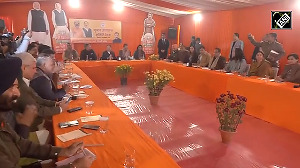Carved out of southern Bihar as a new state on November 15, 2000, Jharkhand has been plagued by adverse conditions -- low average income, high incidence of poverty and little social development because of political instability -- there have been seven government changes.
The Comptroller and Auditor General of India, in its report on state finances for the year ended March 31, 2009, said, "The per capita development expenditure and per capita social sector expenditure in Jharkhand is much lower than the national average."
In 2003-04, the state targeted ground level credit of Rs 3,016 crore, against which the achievement had been Rs 3,112 crore For 2009-10, the target was Rs 13,880 crore, against which the achievement was just Rs 5,825 crore.
However, the World Bank, in a report published in 2007, said, "Despite the adverse initial conditions, there are some early signs of turnaround in several respects. Poverty declined by an impressive average of two percentage points a year between 1994 and 2002. This may be compared to about 2.5 percentage points a year observed at the all-India level during the same period as per official 'unadjusted' data. Progress was highly uneven, however, between the rural and urban areas, with the pace of rural poverty reduction being faster."
Industry sources said lack of government stability was a problem for development policy.
Jharkhand has signed 71 memorandums of understanding (MoUs) with private companies for investment of Rs 2,95,858 crore to set up industrial projects. During the past 10 years, only 12-odd small projects have taken off and the rest could not even start ground work, for want of land; the MoUs had promised the government would ensure this. In a belated decision, the state government withdrew the commitment and asked investors to purchase the requirement for their projects directly from land owners. However, the response from the land owners was snot satisfactory, industry sources said.
Power is an important sector for industries. In the past 10 years, not a single state-run power unit had been set up. The high court had, in May, pulled up the Jharkhand State Electricity Board (JSEB) for failure to generate even a single megawatt of additional electricity since the state's creation in 2000. There are five thermal power units: two of Damodar Valley Corporation and one each of the JSEB, Tenughat Vidyut Nigam Ltd and Tata Power Ltd, with total installed capacity of 2,760 Mw. The plants generate 1,2501,400 Mw. The present requirement, even without the new industries, is 1,700 Mw.
The Associated Chambers of Commerce and Industries of India, in a report issued in August last year, said: "Land acquisition cannot be left to industry alone. While industry is willing to provide compensation and employment, the government should aim at forming a clear land acquisition policy."







 © 2025 Rediff.com -
© 2025 Rediff.com -